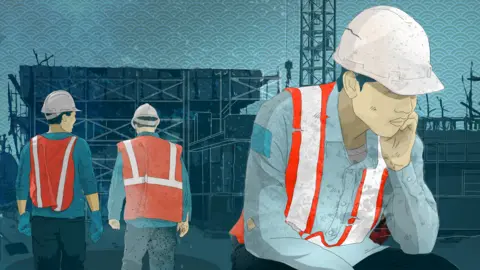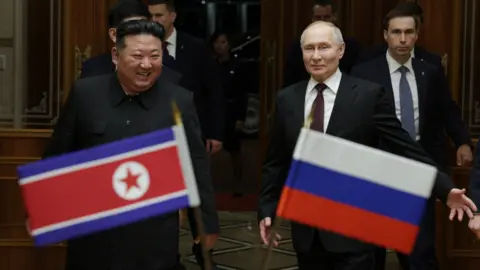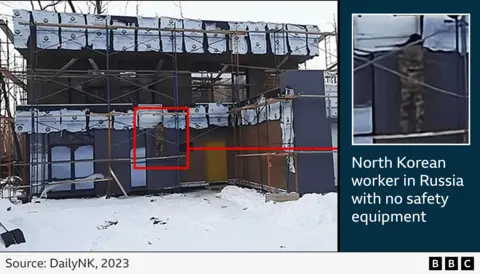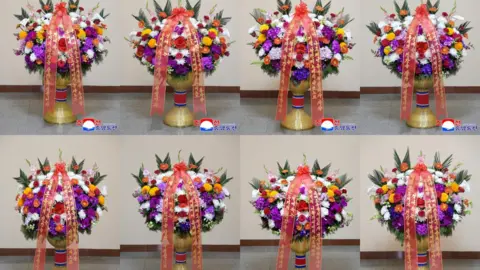Seoul correspondent
 BBC
BBCThousands of North Koreans are being sent to work in slave-like conditions in Russia to fill a huge labour shortage exacerbated by Russia’s ongoing invasion of Ukraine, the BBC has learned.
Moscow has repeatedly turned to Pyongyang to help it fight the war, using its missiles, artillery shells and its soldiers.
Now, with many of Russia’s men either killed or tied up fighting – or having fled the country – South Korean intelligence officials have told the BBC that Moscow is increasingly relying on North Korean labourers.
We interviewed six North Korean workers who have fled Russia since the start of the war, along with government officials, researchers and those helping to rescue the labourers.
They detailed how the men are subjected to “abysmal” working conditions, and how the North Korean authorities are tightening their control over the workers to stop them escaping.
One of the workers, Jin, told the BBC that when he landed in Russia’s Far East, he was chaperoned from the airport to a construction site by a North Korean security agent, who ordered him not to talk to anyone or look at anything.
“The outside world is our enemy,” the agent told him. He was put straight to work building high-rise apartment blocks for 18 hours a day, he said.
All six workers we spoke to described the same punishing workdays – waking at 6am and being forced to build high-rise apartments until 2am the next morning, with just two days off a year.
We have changed their names to protect them.
 Getty Images
Getty Images“Waking up was terrifying, realising you had to repeat the same day over again,” said another construction worker, Tae, who managed to escape Russia last year. Tae recalled how his hands would seize up in the morning, unable to open, paralysed from the previous day’s work.
“Some people would leave their post to sleep in the day, or fall asleep standing up, but the supervisors would find them and beat them. It was truly like we were dying,” said another of the workers, Chan.
“The conditions are truly abysmal,” said Kang Dong-wan, a professor at South Korea’s Dong-A University who has travelled to Russia multiple times to interview North Korean labourers.
“The workers are exposed to very dangerous situations. At night the lights are turned out and they work in the dark, with little safety equipment.”
The escapees told us that the workers are confined to their construction sites day and night, where they are watched by agents from North Korea’s state security department. They sleep in dirty, overcrowded shipping containers, infested with bugs, or on the floor of unfinished apartment blocks, with tarps pulled over the door frames to try to keep out the cold.
One labourer, Nam, said he once fell four metres off his building site and “smashed up” his face, leaving him unable to work. Even then his supervisors would not let him leave the site to visit a hospital.

In the past, tens of thousands of North Koreans worked in Russia earning millions of pounds a year for the North Korean leader, Kim Jong Un, and his cash-strapped regime. Then in 2019, the UN banned countries from using these workers in an attempt to cut off Kim’s funds and stop him building nuclear weapons, meaning most were sent home.
But last year more than 10,000 labourers were sent to Russia, according to a South Korean intelligence official speaking to the BBC on the condition of anonymity. They told us that even more were expected to arrive this year, with Pyongyang possibly dispatching more than 50,000 workers in total.
The sudden influx means North Korean workers are now “everywhere in Russia,” the official added. While most are working on large-scale construction projects, others have been assigned to clothing factories and IT centres, they said, in violation of the UN sanctions banning the use of North Korean labour.
Russian government figures show that more than 13,000 North Koreans entered the country in 2024, a 12-fold increase from the previous year. Nearly 8,000 of them entered on student visas but, according to the intelligence official and experts, this is a tactic used by Russia to bypass the UN ban.
In June, a senior Russian official, Sergei Shoigu, admitted for the first time that 5,000 North Koreans would be sent to rebuild Kursk, a Russian region seized by Ukrainian forces last year but who have since been pushed back.
The South Korean official told us it was also “highly likely” some North Koreans would soon be deployed to work on reconstruction projects in Russian-occupied Ukrainian territories.
“Russia is suffering a severe labour shortage right now and North Koreans offer the perfect solution. They are cheap, hard-working and don’t get into trouble,” said Andrei Lankov, a professor at Kookmin University in Seoul and a renowned expert in North Korea-Russia relations.
 KCNA
KCNAThese overseas construction jobs are highly coveted in North Korea as they promise to pay better than the work at home. Most workers go hoping to escape poverty and be able to buy a house for their family or start a business when they return. Only the most trusted men are selected after being rigorously vetted, and they must leave their families behind.
But the bulk of their earnings is sent straight to the North Korean state as “loyalty fees”. The remaining fraction – usually between $100-200 (£74-£149) a month – is marked down on a ledger. The workers only receive this money when they return home – a recent tactic, experts say, to stop them running away.
Once the men realise the reality of the harsh work and lack of pay, it can be shattering. Tae said he was “ashamed” when he learnt that other construction workers from central Asia were being paid five times more than him for a third of the work. “I felt like I was in a labour camp; a prison without bars,” he said.
The labourer Jin still bristles when he remembers how the other workers would call them slaves. “You are not men, just machines that can speak,” they jeered. At one point, Jin’s manager told him he might not receive any money when he returned to North Korea because the state needed it instead. It was then he decided to risk his life to escape.
Tae made the decision to defect after watching YouTube videos showing how much workers in South Korea were paid. One night, he packed his belongings into a bin liner, stuffed a blanket under his bed sheets to make it look as if he was still sleeping, and crept out of his construction site. He hailed a taxi and travelled thousands of kilometres across the country to meet a lawyer who helped arrange his journey on to Seoul.
In recent years, a small number of workers have been able to orchestrate their escapes using forbidden second-hand smartphones, bought by saving the small daily allowance they received for cigarettes and alcohol.

In an attempt to prevent these escapes, multiple sources have told us that the North Korean authorities are now cracking down on workers’ already limited freedom.
According to Prof Kang from Dong-A University, one way the regime has tried to control the workers over the last year is by subjecting them to more frequent ideological training and self-criticism sessions, in which they are forced to declare their loyalty to Kim Jong Un and log their failings.
Rare opportunities to leave construction sites have also been cut. “The workers used to go out in groups once a month, but recently these trips have reduced to almost zero,” Prof Kang added.
Kim Seung-chul, a Seoul-based activist who helps rescue North Korean workers from Russia, said these outings were being more tightly controlled. “They used to be allowed to leave in pairs, but since 2023 they have had to travel in groups of five and are monitored more intensely.”
In this climate, fewer workers are managing to escape. The South Korean government told us the number of North Koreans making it out of Russia each year and arriving in Seoul had halved since 2022 – from around 20 a year to just 10.
Mr Lankov, the expert in North Korea-Russia relations, said the crackdowns were likely in preparation for many more workers arriving.
“These workers will be the lasting legacy of Kim and Putin’s wartime friendship,” he said, arguing the workers would continue arriving long after the war had ended, and the deployment of soldiers and weapons had ceased.
Additional reporting by Jake Kwon and Hosu Lee










